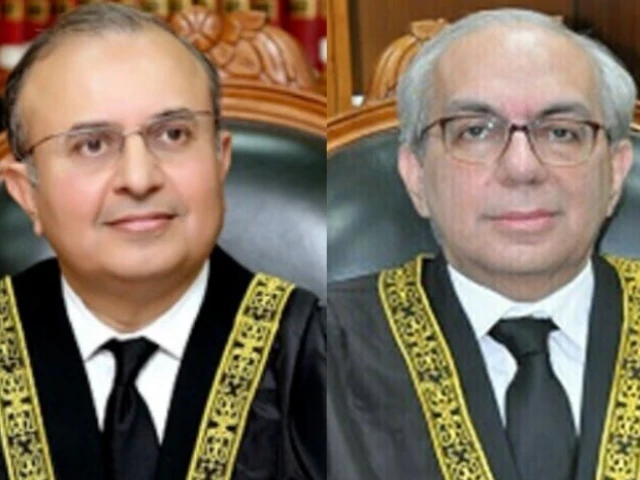Collage of images of Justice Mansoor Ali Shah and Justice Munib Akhtar. — SC website
ISLAMABAD:
Two members of the Supreme Judicial Council (SJC), Justice Syed Mansoor Ali Shah and Justice Munib Akhtar, have raised strong objections to the adoption of the amended Code of Conduct of Judges, warning that the changes undermine judicial independence, centralize authority and could be misused to silence dissenting judges.
In a detailed letter to the SJC, the two judges said: “We are passing through testing times, when democracy itself is facing strains and constitutional institutions are being tested. At such times, a strong, courageous and independent judiciary is the last and only refuge of the people.”
“Any measure that limits that independence or that could be used as a weapon to discipline, silence or control judges must be viewed with the utmost caution and firmly resisted,” they warned.
The judges warned that the new provisions were particularly dangerous because they could be used selectively against individual judges. They said the breadth and vagueness of the amendments allow for “selective application” to suppress inconvenient or dissenting voices.
They also noted that after the 26th Constitutional Amendment, such centralization of power makes the judicial system more fragile, not stronger. Judicial independence cannot be based on a person’s perceived virtue or courage; It must be distributed, not centralized, they stressed.
Both judges held that the amendments to the code of conduct dilute independence, suppress transparency and centralize control in a manner incompatible with both the Constitution and international standards.
They also took issue with the assumption contained in Article XIX that the Chief Justice is “immune from influence” and able to resist pressure once that office is informed.
“Equally troubling is the fanciful assumption underlying Article XIX: that the chief justice is immune to influence and institutionally capable of resisting pressure once it is reported to that office.”
“Experience has shown that when the institution itself is under pressure, especially after the 26th Constitutional Amendment, such concentration of authority makes the system more fragile, not stronger,” they wrote.
Objection to the inclusion of Judge Dogar
Both judges opposed the inclusion of Islamabad High Court Chief Justice Sarfraz Dogar as a member of the SJC, pointing out that an intra-judicial appeal regarding his transfer case is still pending.
They stated that the SJC meeting should be postponed until a final decision on the appeal.
“The authority of the SJC rests squarely on the public trust. With all due respect, Judge Dogar’s participation in Council meetings or proceedings while the aforementioned appeals remain pending may, even if unintentional, cast doubt on or undermine the credibility of any decision rendered by the Council during such proceedings,” they wrote.
“We have no doubt that Judge Dogar himself, recognizing the seriousness of this forum and the importance of public confidence in his work, would consider it incumbent on him to recuse himself from the Council during the processing of the appeals and a final decision thereon. Any such action would be in line with the imperatives of transparency, constitutional ownership and institutional integrity.”
The two judges also strongly opposed discussion of the Judges’ Code of Conduct at the National Judicial Policy Development Committee (NJPMC), arguing that the body lacks constitutional authority to consider such amendments.
“No member of the Council, including the president, has the authority to submit proposed amendments to any other body, least of all the NJPMC, which has no constitutional jurisdiction in this regard,” they wrote.
They said that since the three chief justices serving on the SJC are also ex officio members of both the NJPMC and the SJC, their participation in passing the amendments at the NJPMC meant that “the majority of the SJC had effectively pre-decided the matter before it was even brought before the Council.”
“The two remaining deputies were excluded from the process and deprived of equal participation,” they stated.
The judges argued that the proposed amendments could not legally be considered by the current SJC. “At a minimum, constitutional expediency required that the matter be dealt with solely by a Council reconstituted pursuant to Article 209, excluding those members who had participated in the deliberations of the NJPMC,” they stated.
They said their objections were rejected by the majority, which proceeded to “approve” the same amendments that had already been approved a day earlier.
The two judges warned that the proposed changes, including the amendment of Article V, the insertion of Article XIX and the incorporation of the 2003 SJC Resolutions, raise serious concerns about the independence, autonomy and transparency of the judiciary.
“These proposals, if adopted, will restrict judicial freedom, transform an open and collegial institution into a closed and hierarchical one, and create avenues of control, both internal and external,” they said.
The letter concluded with a clear recommendation that no amendment should be made to the Code of Conduct of Judges until the decision on the 26th Constitutional Amendment is finalized.




